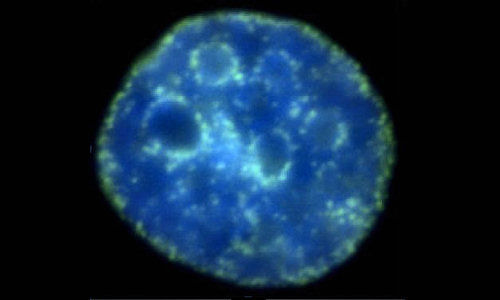Cells in our body are constantly dividing to maintain our body functions. At each division, our DNA code and a whole machinery of supporting components has to be faithfully duplicated to maintain the cell’s memory of its own identity.
Researchers at BRIC, University of Copenhagen, have developed a new technology that has revealed the dynamic events of this duplication process and the secrets of cellular memory. The results are published in Nature Cell Biology
In 2009, two women at BRIC, University of Copenhagen joined forces to develop a new technology that could elucidate the mystery behind cellular memory. Today, they are celebrating their first big discovery using this technology.
“Our technology can isolate the small molecular building blocks that bind to our DNA strand and organize it into a stringent architecture. Importantly, our technology can follow the dynamic duplication processes in our cells and can therefore reveal the life cycle of these DNA-complexes”, says postdoc Constance Alabert who has been leading the laboratory work.
The molecular building blocks that our DNA is wrapped around are called histones and together, the DNA strand and the histones form a stringent structure called chromatin. When our cells divide during development and throughout life to maintain our body functions, the DNA code has to be faithfully duplicated and so do the chromatin and its architecture.
Chromatin contains crucial information that tells our genes when to be active and when to be silent. For example, information stored in the chromatin silence liver specific genes in heart cells and vice versa. Therefore, the entire chromatin structure has to be duplicated at each cell division to maintain a cell’s memory of its own identity.
New molecules stabilize cellular memory
It is no longer debated that the chromatin structure is crucial to maintain cell identity, but the how remains. As only hypothesis driven approaches has been available to study the dynamic event of chromatin duplication, only few molecular factors have been linked to the process.
“With our new technology, we have identified 100 new molecular components that appear to be involved in the tightly regulated process of chromatin duplication and thereby maintenance of cell memory. Thus, we provide a robust technology and the first comprehensive resource to address fundamental questions regarding maintenance of cell identity”, says associate professor Anja Groth, who is heading the laboratory.
Understanding the fundamental principles of how chromatin is faithfully duplicated is essential to understand how our organism is developed and maintained, and also how diseases such as cancer arise. If cells lose their chromatin memory, they can potentially develop into cancer cells and form tumours. Such a loss of what is also called ‘epigenetic’ memory is now known to be involved in almost all cancer types. The next step for the researchers will be to decipher the mode of action of the 100 new chromatin factors.
Story Source:
The above story is based on materials provided by University of Copenhagen.





